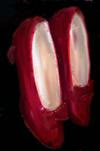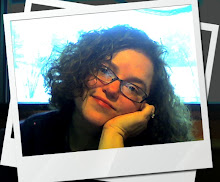
Let me get one thing straight: I'm not a city girl.
Let me get another thing straight: I like to visit cities occasionally, and glean their culture and learn their lessons.
My family and I just got back from a short trip to Chicago. My husband was at the
AMA meeting (didn't get to see
Obama, though....we left right before he came.) Some of the time he was in meetings and some of the time he got to sight-see with us.
We hit the following attractions:
Millennium Park,
The Art Institute of Chicago,
The Navy Pier,
The Sears Tower (skydeck),
The Cadillac Palace Theater (to see
Mary Poppins) and a
double-decker bus tour of the city (on a nice, sunny afternoon). We sampled the world-renowned Chicago-style pizza at
Giordano's and
hot dogs at the Navy Pier vendors (upon which no one warned not to put ketchup until it was too late). We froze our butts off, since 75 degrees in the
windy city doesn't really feel like 75 degrees, and 65 degrees in the rain feels very, very cold!
I didn't imagine my daughters would like the Art Institute. I drug them along because it housed my all-time favorite painting:
Nighthawks, by Edward Hopper. However, they loved it. They loved the layout of the place and the modern art and all of the lights and designs. There was even some interactive art that captivated them.
The girls thought the double-
decker bus tour was fantastic. We had a fantastic day for it! The architecture of Chicago is really second to none. Each building and skyscraper is clearly trying to outdo the one beside it. We saw buildings that rippled like water, that spiraled like corncobs, that jutted straight up like monolithic and foreboding rectangles, that
hearkened back to a
Gothic age, that resembled castles, art
nouveau, art deco, modern and ultra modern.
It's really amazing how all the different cities in the U.S. have a different flair and a different personality. New York and Chicago are very, very different towns, as are L.A., Atlanta, Washington D.C. and San Francisco. Seeing these cities make me so proud of our nation.
It also makes me sad, because in all of these cities, my family and I have seen the
homeless pulling their greasy blankets around them, too ashamed usually to even beg. I rarely see them in rural America, although they are there too. You don't
sight see pedestrian-style in rural America, so you're not forced to step over the sleeping dispossessed.
My daughters were struck by them as well. They didn't even know what questions to ask about the homeless Americans of the streets.
But when we went to see
Mary Poppins, the Broadway in Chicago musical, the scene with the
Bird Lady haunted all of us. It was more poignant, somehow, for me as an adult than it was when I was a child. When I saw this movie years and years ago, I thought the bird lady was just being nice to the birds. I didn't consider that feeding the birds the breadcrumbs, purchased for tuppence a bag, was her sole source of income.
While we were watching this scene, my older daughter turned to me and said, "Mommy, she's homeless, isn't she?"
I said, "Yes, she is."
"Why does she want us to feed the birds?" My daughter asked.
"Because if you pay her for the bird food, she can have the money to live, honey." I answered.
"Oh. . . are you crying a little, Mommy?" She asked.
"Yes, a little." I responded.
I don't want to count up how much money I spent while we visited Chicago - on airplane tickets,
accommodations, meals in restaurants, souvenirs, tours and incidentals. I don't want to count it up because I feel guilty about it.
Early each day to the steps of Saint Paul's
The little old bird woman comes
In her own special way, to the people she calls,
"Come, buy my bags full of crumbs;
Come feed the little birds,
Show them you care
And you'll be glad if you do
Their young ones are hungry
Their nests are so bare
All it takes is tuppence from you
Feed the birds, tuppence a bag
Tuppence, tuppence, tuppence a bag
Feed the birds," that's what she cries
While overhead, her birds fill the skies
All around the cathedral the saints and apostles
Look down as she sells her wares
Although you can't see it,
You know they are smiling
Each time someone shows that he cares
Though her words are simple and few
Listen, listen, she's calling to you
"Feed the birds, tuppence a bag
Tuppence, tuppence, tuppence a bag"
(I'm proud of the photograph above: Twilight in Chicago - taken by me, 6/11/09)









